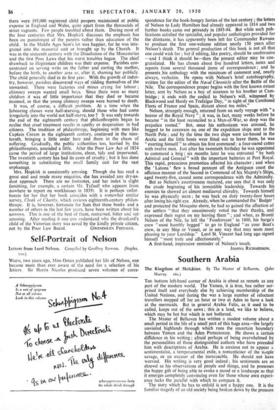Self-Portrait of Nekon
WHEN, two years ago, Miss Oman published her life of Nelson, one became more eathan ever aware aof the need for a selection of his letters. Sir Harris Nicolas produced seven volumes of corre- spondence for the book-hungry forties of the last century ; the letters of Nelson to Lady Hamilton had already appeared in 1814 and two further books came out privately in 1893-94. But while such pub- lications satisfied the specialist, and popular anthologies provided for the dilettante, it has apparently been left for Commander Rawson to produce the first one-volume edition nearly 150 years after Nelson's -death. The general production of this book is not all that one could wish for ; but if editing, like poetry, should be unobtrusive —and I think it should be—then the present editor may be con- gratulated. He has chosen about five hundred letters, notes and reports from several thousand items of correspondence and he presents .his anthology with the minimum of comment and, nearly always, verbatim. He opens with Nelson's brief autobiography, written for the editor of the Naval Chronicle after the Battle of the Nile. The correspondence proper begins with the first known extant letter, sent by Nelson as a boy of nineteen to his brother at Cam- bridge ; it ends with the codicil to Nelson's will, witnessed by Blackwood and Hardy on Trafalgar Day, " in sight of the Combined Fleets of France and Spain, distant about ten miles." Nelson, strangely enough, returned from an early voyage with "a horror of the Royal Navy " ; it was, in fact, many weeks before he became " in the least reconciled to a Man-of-War, so deep was the prejudice rooted." But, once his enthusiasm was aroused, he begged to be coxswain on one of the expedition ships sent to the North Pole ; and by the time the two ships were ice-bound in the Arctic and the little boats were fitted out to leave them, he was " exerting himself " to obtain his first command: a four-oared cutter with twelve med. Just after his twentieth birthday he was appointed to command a brig ; six months later he was entrusted " by both Admiral and General " with the important batteries at Port Royal. This rapid, precocious promotion affected his character ; and when the Latona ' flew a broad pennant off the Antiguan coast the officious manner of the Second in Command of his Majesty's Ships, aged twenty-five, caused some correspondence with the Admiralty. - But as Nelson's assertiveness matured, one sees that it was only the crude beginning of his irresistible leadership. Towards his enemies he showed an almost mediaeval chivalry. Towards himself he was physically stern; he was back on duty twenty-four hours after losing his right eye. Already, when he commanded the' Badger' and protected the Mosquito shore, he had so gained the affection'of the settlers " that they unanimously voted me their thanks,and ' expressed their regret on my leaving them " ; and when, as Brontë Nelson of the Nile, he left the Foudrovant ' in 1800, his barge's crew " most humbly begged " to go to England " as your Boat's crew, in any Ship or Vessel, or in any way that may seem most pleasing to your Lordship." Lord St. Vincent had long ago signed himself " most truly and affectionately."
A first-hand, impressive reminder of Nelson's touch.
JOANNA RICHARDSON.


































 Previous page
Previous page